
 Christian Thorsberg
The Hockey Writers
Christian Thorsberg
The Hockey Writers
44
Reads
0
Comments
Ilya Kovalchuk: A Career Retrospective
On January 6, 2006, late in the second period of a regular-season Pittsburgh Penguins-Atlanta Thrashers tilt, a 22-year-old Ilya Kovalchuk is left dangerously uncovered on the near-side point of the Thrashers’ power play. As the Penguins’ defense flails hopelessly to recover, the Russian scorer, receiving a cross-slot pass, wastes no time blasting a one-time slap shot past goaltender Marc-Andre Fleury. It’s good for his second goal of the game: 5-0 Thrashers.
Related: Canadiens: 4 Late-Round Draft Steals
Without hesitation, Kovalchuk tucks his stick and points stoically to the Pittsburgh penalty box, where a teenaged Sidney Crosby is exiting after being tagged with his second slashing minor of the game. Earlier, Kovalchuk had instigated the first unwise infraction, and minutes later, sent Crosby into the splits with a tough check along the boards. With his marksman gesture and emotionless glare, Kovalchuk makes his point clear: game, set, match, Sid the Kid.
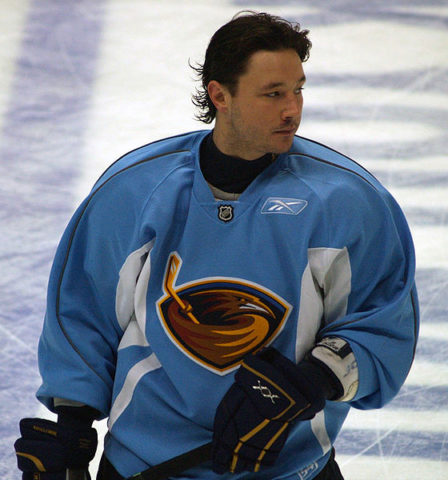
The man they call Kovy added an empty-netter later that night, completing the hat trick and icing Atlanta’s victory. The next evening in Pittsburgh, the back-end of a home and home, Kovalchuk added two more goals to lead to another Thrashers’ win. The pair of shining outings from the superstar sat at the heart of an eight-game point streak, which yielded 11 goals and seven assists. He’d finish the season, his fourth in the NHL, with 98 points in 78 games, his most productive campaign to date.
This red-hot microcosm of Kovalchuk’s career lays bare the two traits that best encapsulate his flair, both on and off the ice: an unabashed self-confidence, and the relentless scoring ability to back it up. Sitting today on the Hall of Fame bubble with his NHL future up in the air, we revisit the stylish sniper’s transcontinental hockey career and milestones.
Russia’s First #1 Pick Bursts Onto the Scene
Ilya Kovalchuk became Russia’s inaugural number one draft pick when the Thrashers selected him first in the 2001 NHL Entry Draft. His 2001-02 debut season, cut short by a shoulder injury, was productive: he tallied 51 points in 65 games, a feat that, among rookies, was bested only by his teammate and eventual Calder Trophy winner, Danny Heatley.
Despite this second-place Rookie of the Year finish, the 18-year-old Kovalchuk’s skilled play and abundant offensive talent signaled hope for the floundering Atlanta franchise and, coupled with that year’s debut of fellow countryman Pavel Datsyuk, incurred excitement for the NHL’s newest Russian stars.
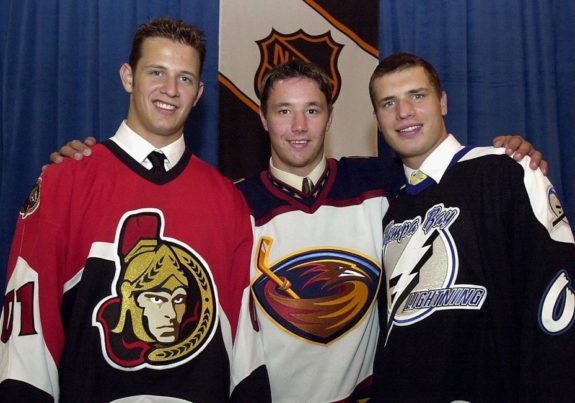
Kovalchuk did nothing but improve his scoring touch over the next two seasons, putting up 67 and then 87 points in 81 games apiece. In this latter campaign, with 41 goals, he shared the “Rocket” Richard Trophy, for having the most goals, with Jarome Iginla and Rick Nash, while leading the league in shots on goal with 341. His status as a prolific scorer was further enhanced by his aforementioned 52-goal, 98-point season, the year after. His on-ice flash and statistical consistency cemented him as a true offensive superstar, and today remains the only Thrasher/Jet to score 50 goals in a season (he did it twice, both with 52).
A Postseason Berth and Captaincy
Kovalchuk’s arrival and growth in Atlanta had slowly helped pull the team from the cellar of the NHL standings, but he thus far remained exclusively a regular-season threat. At last, led in 2006-07 by the European trio of Marian Hossa, Vyacheslav Kozlov, and Kovalchuk, the Thrashers clinched the Southeast Division to earn the franchise its inaugural playoff appearance against the New York Rangers.
In his second postseason game, late in the third period, Kovalchuk rallied a forecheck and forced a takeaway before, moments later, sending a one-timer past a frozen Henrik Lundqvist for his first career playoff goal. It was a shining moment, but the Thrashers would nonetheless go on to be swept, and Kovalchuk would fail to reach the postseason in Atlanta again.
Kovalchuk returned to his routine form as a regular-season juggernaut, notching 52 more goals in 2007-08. But it was his off-ice leadership that was soon rewarded: after Bobby Holik’s departure left the Thrashers’ captaincy vacant, on January 11, 2009, Kovalchuk was named the sixth captain in team history. That fall, in the second game of his first full season wearing the ‘C,’ Kovalchuk scored twice against the Blues: goals 300 and 301 of his NHL career.
The Devils in the (Contract) Details
With free agency looming and a breakup with Atlanta imminent, Kovalchuk was traded to the New Jersey Devils on February 4, 2010. He became the team’s first bonafide superstar scorer in years –– perhaps ever –– and immediately energized a lineup that for two decades had relied heavily on defensive play for success. He added two assists in his Devils’ debut and finished his half-season in New Jersey averaging a point per game.
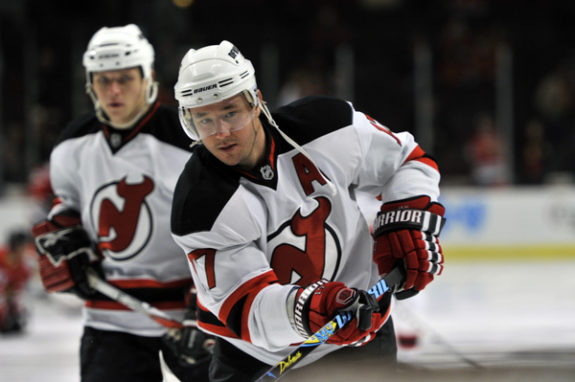
Kovalchuk being the biggest prize of free agency that summer was a given, but the record-breaking offer he agreed to shocked the world: a whopping 17-year, $102 million contract to stay with the Devils. At the behest of the NHL, who deemed it an illegal circumnavigation of the salary cap, Kovalchuk eventually added his Hancock to a much more modest 15-year, $100 million agreement. He would be a Devil until 2025… or so we thought at the time.
Regardless of the closed-door discussions he was having with then-Devils general manager Lou Lamoriello about a return to Russia, Kovalchuk’s continued his on-ice production and activated his clutch gene for an improbable Stanley Cup Final run with the Devils in 2011-12. His eight goals and 19 points in 23 games led the Devils and ranked among playoff offensive leaders; had he not been hampered with an injury in the Final, and the Devils had won the Cup, he would have been a strong Conn Smythe consideration.
To Russia and Back
The following year’s lockout, which allowed Kovalchuk a half-season to play with the KHL’s SKA Saint Petersburg, expedited a decision he had been mulling over for some time: an NHL retirement. The official announcement came down on July 11, 2013: in addition to New Jersey and the NHL, he’d be leaving 12 years and $77 million on the table, which stuck in the craw of Devils’ fans everywhere, who were watching their team forfeit the next year’s first-round draft pick as punishment for the original nixed contract. Kovalchuk departed having scored 816 points in 816 NHL games.
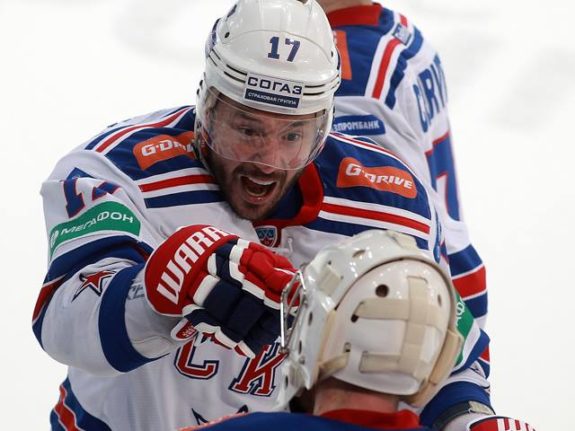
Less than a week later, he signed a luxurious four-year deal with the Saint Petersburg club and soon thrived in his native country. In his five total seasons back in Russia, from 2013-2018, the team won the KHL’s Gagarin Cup twice and Kovalchuk was a three-time all-star. His 285 points in 262 games drew attention from NHL clubs, and upon his KHL contract expiration, he accepted a three-year deal with the Los Angeles Kings, beginning in 2018-19.
His second NHL stint, though, has represented his only truly inconsistent stretch of hockey. After, by his standards, a relatively unproductive first season back –– 34 points in 64 games for a last-place Kings team –– his second year with the team ended abruptly when his contract was terminated in December 2019.
The Montreal Canadiens took a chance and signed the aging winger, who surprised everyone by playing his way into a trade deadline dilemma –– his value as a solid veteran for the Habs made him a potential keeper. But, in a playoff-push depth acquisition, the Washington Capitals added Kovalchuk for a 2020 third-round draft pick. It appeared to be his best chance at finally playing for that elusive Stanley Cup, though things hardly went Washington’s way in the Toronto bubble: eliminated in five games by the New York Islanders, Kovalchuk didn’t record a point.
Next Stop: Montreal? Then…Toronto?
Per Eric Engels of Sportsnet, it appears that the 37-year-old enjoyed his time in Montreal –– it was also the most productive of his three stops last season –– and will, in all likelihood, be returning to the Canadiens for the 2020-21 season. The Habs enjoyed an overachieving playoff run this summer, and could certainly benefit from Kovalchuk’s veteran presence and end-of-career hunger for Lord Stanley. By all accounts, he appears to still have a few years’ worth of productive hockey in him, and won’t be playing for anyone but a legitimate contender.

But when he does decide to –– for a second time –– retire from the NHL, he’ll leave behind a legacy of explosive offense, and will rank as one of the best Russian players in the league’s history. As things currently stand, he is seventh all-time in points by a Russian-born player (876), fourth in goals (443), and 11th in games played (926). In the KHL, in 298 games, he notched 327 points, good for 17th all-time. It also wouldn’t be far-fetched to see him finish his professional career with a few more years in Russia, playing close to home.
So, will Kovalchuk earn a plaque in the Hockey Hall of Fame? The eye-test and offensive statistics are surely indicative that he’s worthy of a selection. Though he doesn’t have much of a winning pedigree in the NHL, his international (multiple medals, including golds, in the Olympics, World Championships, and IIHF U18 Tournament) and KHL resume (two-time champion, finals MVP) demonstrates his ability to lead successful teams. It is, after all, the Hockey Hall of Fame, not just exclusive to the NHL.
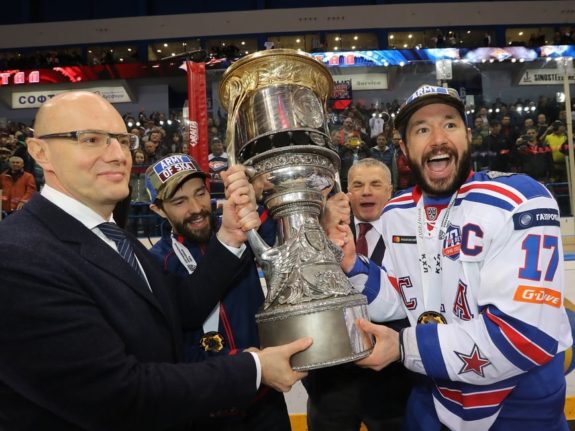
It might be noteworthy, albeit controversial given the divisive nature of the metric, to add that Kovalchuk –– at a career minus-146 –– would have the third-worst plus-minus of all Hall of Famers, for whom this statistic is known. Then again, he never was touted specifically for stellar defensive play, and he spent a good portion of his early playing days surrounded by a lackluster supporting cast.
Related: The Rise and Fall of Andrew Raycroft
An interesting player comparison, for a pro-Hall of Fame argument, could be Pavel Bure: the “Russian Rocket,” with fewer NHL goals, assists, points, and games played than Kovalchuk, was inducted in 2012. But, with a few good years left in Kovalchuk, and his sights set on a championship run, we’ll be waiting on a final verdict. Adding his name to the Stanley Cup, in addition to cementing a very likely Hall of Fame bid, would be a fitting cherry on top of an illustrious hockey career.
The post Ilya Kovalchuk: A Career Retrospective appeared first on The Hockey Writers.
Popular Articles

















































 Canucks Vancouver
Canucks Vancouver Sharks San Jose
Sharks San Jose Flames Calgary
Flames Calgary Avalanche Colorado
Avalanche Colorado Coyotes Arizona
Coyotes Arizona Golden Knights Vegas
Golden Knights Vegas Wild Minnesota
Wild Minnesota Red Wings Detroit
Red Wings Detroit Blues St. Louis
Blues St. Louis Blackhawks Chicago
Blackhawks Chicago Blue Jackets Columbus
Blue Jackets Columbus Hurricanes Carolina
Hurricanes Carolina Jets Winnipeg
Jets Winnipeg Predators Nashville
Predators Nashville Ducks Anaheim
Ducks Anaheim Oilers Edmonton
Oilers Edmonton Sabres Buffalo
Sabres Buffalo Rangers New York
Rangers New York Bruins Boston
Bruins Boston Panthers Florida
Panthers Florida Senators Ottawa
Senators Ottawa Lightning Tampa Bay
Lightning Tampa Bay Capitals Washington
Capitals Washington Islanders New York
Islanders New York Devils New Jersey
Devils New Jersey Maple Leafs Toronto
Maple Leafs Toronto Flyers Philadelphia
Flyers Philadelphia Penguins Pittsburgh
Penguins Pittsburgh Stars Dallas
Stars Dallas Kraken Seattle
Kraken Seattle Kings Los Angeles
Kings Los Angeles






